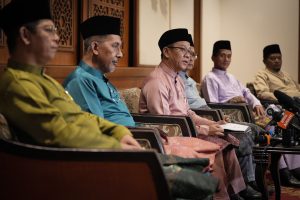The Thai government and Muslim separatist rebels in southern Thailand have agreed on a roadmap to try to end the region’s long-running conflict, according to the Malaysian facilitator of the talks.
In a news conference in Kuala Lumpur yesterday evening, Malaysian facilitator Zulkifli Zainal Abidin said that the two sides had agreed “in principle” to a peace plan, according to The Associated Press.
“It is a major breakthrough after the dialogue was stalled the past year due to the Thai election,” he told the press, adding that if the two sides’ negotiating teams agreed, the plan would “be signed as soon as possible.”
“There is light at the end of the tunnel,” Zulfikli added. “Both parties are willing to put pen on paper. Previously there was no talk of signing any documents.” During the press conference, he was flanked by Chatchai Bangchaud, the Thai chief negotiator, and Ustaz Anas Abdulrahman from the Barisan Revolusi Nasional (BRN), the largest of the insurgent groups in southern Thailand.
Anas told reporters that he has high hopes for a lasting solution under the new Thai government led by Prime Minister Srettha Thavisin, which took office in September.
Yesterday’s announcement came after two days of meetings in Kuala Lumpur, which will be followed by further meetings in the coming weeks to finalize the details of the plan. According to news agency reports, the two sides hope to begin by agreeing to a ceasefire covering the Muslim fasting month of Ramadan, which starts on March 10, and the Thai festival of Songkran in mid-April. From there will begin to intricate process of ironing out the various technical aspects of the peace plan.
The Muslim separatist insurgency in southern Thailand has been simmering for decades. But the campaign escalated in the early 2000s, when rebels began bombing and launching arson attacks on police and military facilities, local government offices, and other symbols of the Thai state. Since then, the conflict has taken the lives of about 7,000 civilians, soldiers, government workers, and rebels.
In 2013, Malaysia’s government began serving as a mediator in the peace talks between Bangkok and the separatist groups, but the stop-start negotiations have not made much progress.
The momentum has appeared to pick up since Malaysian Prime Minister Anwar Ibrahim took office in November 2022. Two months into his tenure, Anwar appointed Zulfikli, a retired army general, as the official Malaysian facilitator of talks between the Thai government and BRN, and the conflict dominated the agenda of his state visit to Thailand the following month. He told then Prime Minister Prayut Chan-0-cha that “it is our duty as good neighbors and family to do whatever is required and necessary to facilitate the process.”
That month, the talks experienced something of a breakthrough, with the two sides agreeing to a roadmap for the resolution of the conflict, but the BRN then put the talks on hold, nominally to await the outcome of the Thai general election in May. At the time, however, the International Crisis Group reported that the “decision to step back from talks reflects tensions within its own ranks about where the dialogue is headed.” This division, it said, was between the between a political leadership more open to negotiation and “a military wing that still aims for independence.”
Since then, however, Srettha’s civilian government has taken office, ending nearly a decade of military and military-backed rule under Prayut. The situation has also no doubt been helped by the Thai government’s appointment of Chatchai as its lead negotiator; he is the first civilian to fill that role, which could help the government move beyond viewing the southern conflict through a narrow security lens.
































